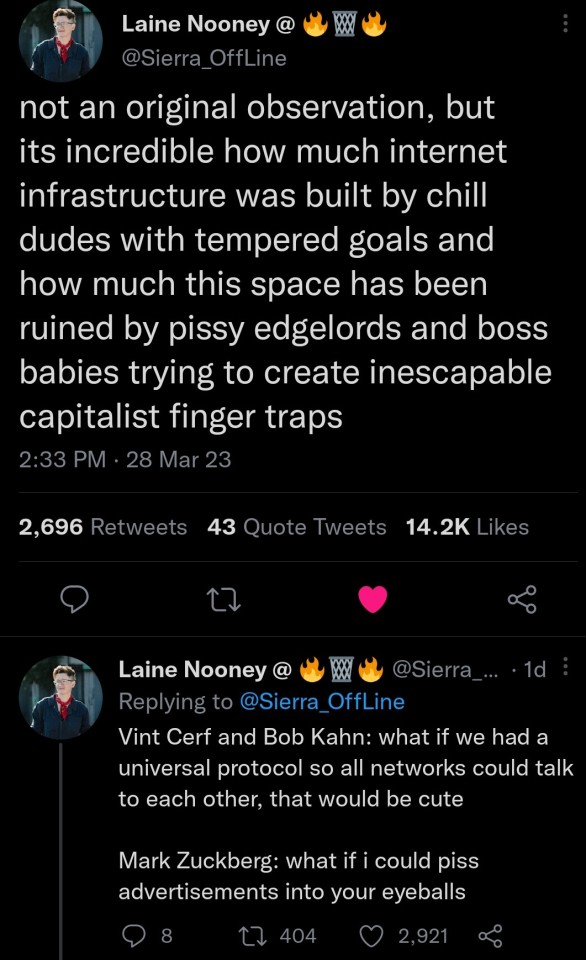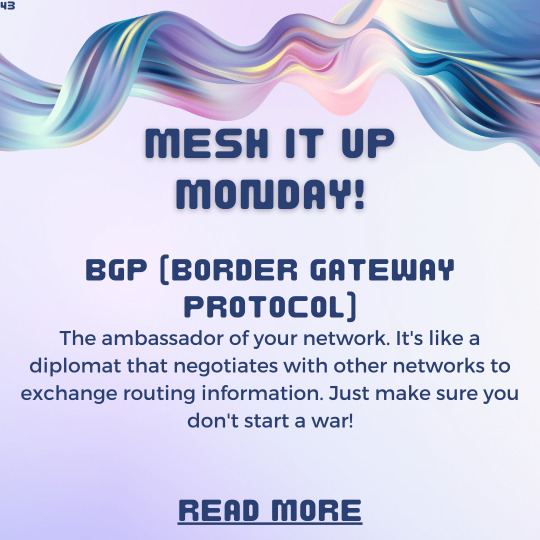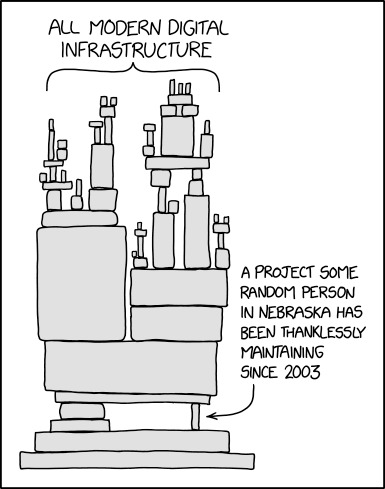#Internet Infrastructure
Explore tagged Tumblr posts
Text
AN OPEN LETTER to THE U.S. CONGRESS
Fund the Affordable Connectivity Program NOW!
130 so far! Help us get to 250 signers!
I’m a concerned constituent writing to urge you to fund the Affordable Connectivity Program or ACP. Digital connectivity is a basic necessity in our modern world and the internet must be treated as a public utility. We use the internet to apply for jobs, perform our jobs, receive telehealth medical treatment, and pay bills, and students use it to complete homework assignments. But for millions of people in rural and urban areas, and Tribal communities, the internet is a luxury they cannot afford. Failure by Congress to fund this program will force millions of households already on tight budgets to choose between being able to stay online or potentially losing access to this essential service. If Congress doesn’t act fast, funding for the Affordable Connectivity Program will run out and more than 22 million Americans -- 1 in 6 households -- will lose this vital service. The implications of this will be devastating. In 2019, 18% of Native people living on Tribal land had no internet access; 33% relied on cell phone service for the internet; and 39% had spotty or no connection to the internet at home on their smart phone. The ACP has enrolled 320,000 households on Tribal lands -- important progress. The largest percentage gains in broadband access are in rural areas. Nearly half of military families are enrolled in ACP, as are one in four African American and Latino households. Losing access and training on using computers and the internet will have devastating impacts on all these communities as technology becomes increasingly integral to work, education, health, and our everyday lives. Without moves to address tech inequality, low-income communities and communities of color are heading towards an “unemployment abyss.” The Affordable Connectivity Program has broad bipartisan support because it is working. As your constituent, I am urging you to push for renewed funding for the ACP before it runs out in the coming weeks.
▶ Created on April 11 by Jess Craven
📱 Text SIGN PJXULY to 50409
🤯 Liked it? Text FOLLOW JESSCRAVEN101 to 50409
#JESSCRAVEN101#PJXULY#resistbot#petition#Affordable Connectivity Program#Digital Divide#Internet Access#Broadband Access#ACP Funding#Congress Funding#Public Utility#Internet Equality#Telehealth#Telemedicine#Internet Inequality#Digital Inclusion#Internet For All#Rural Connectivity#Bipartisan Support#Internet Infrastructure#FCC#ACP Support#Digital Navigation#Online Education#Remote Work#Job Access#Telecommunications#Internet Service#Internet Affordability#Digital Equity
4 notes
·
View notes
Text
The internet is like Vegas. It went from being run by the fun kind of criminals to being run by the boring kind

92K notes
·
View notes
Text
#Critical Infrastructure#Cyber Attacks#DNS Failures#facts#Internet Infrastructure#life#National Security Threats#Podcast#Salt Typhoon Attacks#Satellite Communication Disruptions#serious#State-Sponsored Hacking#straight forward#truth#U.S. Telecommunications#Undersea Cable Vulnerabilities#upfront#website
0 notes
Text
Bridging the Connectivity Gap: How Fixed Wireless Augments Fiber for WISPs and ISPs

In today’s digital era, reliable internet connectivity is no longer a luxury but a necessity. However, there are still many areas where traditional wired infrastructure, such as fiber-optic cables, may not be feasible due to geographical constraints or cost limitations. This is where fixed wireless technology comes to the rescue, empowering Wireless Internet Service Providers (WISPs) and Internet Service Providers (ISPs) to bridge the connectivity gap and provide high-speed internet access in underserved regions. In this blog post, we’ll explore how fixed wireless is being used to augment fiber for WISPs and ISPs, enabling efficient and cost-effective network deployments.
Understanding Fixed Wireless Technology
Fixed wireless technology utilizes radio signals to establish a wireless connection between a transmission point (typically a tower or a base station) and a receiving antenna installed on a customer’s premises. Unlike mobile wireless networks, which serve devices in motion, fixed wireless is designed for stationary connections over longer distances.
Augmenting Fiber with Fixed Wireless
*Extending Coverage to Rural and Remote Areas
Fiber-optic cables are often limited to urban or densely populated areas due to the significant infrastructure investments required. However, rural and remote regions, which suffer from a lack of reliable connectivity, can benefit greatly from fixed wireless deployments. WISPs and ISPs can leverage fixed wireless technology to establish point-to-point or point-to-multipoint connections, enabling them to extend their network coverage beyond the reach of fiber-optic infrastructure. This approach ensures that even customers in remote locations can access high-speed internet services.
*Rapid Deployment and Cost Efficiency
Installing fiber-optic cables involves significant time, resources, and infrastructural modifications, making it impractical in certain areas. Fixed wireless, on the other hand, offers a more agile and cost-effective solution. By leveraging existing towers or infrastructure, WISPs and ISPs can quickly deploy fixed wireless networks, bypassing the need for extensive construction or rights-of-way negotiations. This enables them to serve customers in a shorter timeframe and at a fraction of the cost compared to fiber deployments.
*Last-Mile Connectivity
In many cases, the challenge lies in providing the “last mile” connectivity, which refers to the final leg of the network that connects individual premises to the ISP’s infrastructure. Fiber-optic cables may terminate at a local point of presence (POP), but delivering the service to individual homes or businesses may require additional infrastructure and costs. Fixed wireless acts as a viable solution to address this challenge, offering a wireless connection directly from the nearest tower to the customer’s premises. By utilizing fixed wireless technology for the last mile, WISPs and ISPs can overcome geographical obstacles and deliver high-speed internet services directly to end-users.
*Redundancy and Network Resilience
Fiber-optic networks are known for their reliability and high bandwidth capacity. However, they are not impervious to physical damages caused by natural disasters, construction accidents, or equipment failures. By integrating fixed wireless as a redundant connectivity option, WISPs and ISPs can ensure network resilience. In the event of fiber outages, fixed wireless connections can seamlessly take over, minimizing service disruptions and maintaining internet access for customers.
Conclusion
Fixed wireless technology is revolutionizing the way WISPs and ISPs provide internet connectivity, particularly in areas where traditional wired infrastructure falls short. By augmenting fiber-optic networks with fixed wireless solutions, these service providers can extend coverage to underserved regions, rapidly deploy networks, overcome last-mile challenges, and enhance network redundancy. As technology continues to advance, fixed wireless will play an increasingly vital role in bridging the connectivity gap and bringing reliable high-speed internet access to communities around the world.
Checkout more topics — https://isprevolution.io/blog/
#Connectivity Gap#FixedWireless#fiber optics#WISPs#isps#Internet Infrastructure#BroadbandAccess#wireless technology
1 note
·
View note
Text
Mesh it Up Monday: BGP - The Glue That Holds the Internet Together
🌐💪🔗 Ever wondered how the internet stays connected across the globe? It’s all thanks to a magical protocol called BGP, or Border Gateway Protocol. BGP is like the glue that holds the internet together, ensuring that data flows smoothly between different networks and making the world feel like a smaller, more connected place. In this Mesh it Up Monday post, we’ll demystify BGP, explain how it…

View On WordPress
#BGP#Border Gateway Protocol#Data Transfer#internet black holes#internet connectivity#internet infrastructure#ISPs#network performance#network routing
0 notes
Text
It's important to me to note that it was not the furries that fucked up.
In fact, I'm pretty sure a lot of the people fixing the problem, one computer at the time, were furries.

A global outage of IT systems worldwide because of one faulty software update?? Totally unpredictable.
26K notes
·
View notes
Text


baby hannie
for @hongjoongpresent
#i remember watching this skz code at my mom's house and her being extremely confused#stray kids#createskz#han jisung#hyunjin#3rachasource#forhanji#bystay#userbeepls#usertsu#leenope#userjinnie#userlau#usersun#usersa#userlluna#usermask#okay back to writing my paper on fucking internet infrastructure#a topic i picked for myself for some reason#mine
458 notes
·
View notes
Text
It's my headcanon that there's not a galactic-wide holonet. That infrastructure just isn't there. Individual planets like coruscant probably have a holonet, sure, and some core worlds are connected to each other, but for a lot of the galaxy, most of the galaxy even, the average person just doesn't have access to a galactic equivalent of Earth's internet.
#The main reason they don't is just because the og SW was written before we had internet#and the worldbuilding grew from that point#but also we get our internet from a boatload of infrastructure#miles of cable#servers#satellites#and so on#so basically tattooine? not really on the web
250 notes
·
View notes
Text
re: the fiction/nonfiction kinsey scale poll. just know that I am barely restraining myself from giving nonfiction book recs at all times. there is SO MUCH FUN NONFICTION THAT IS SUPER READABLE AND INTERESTING take my hand we can go pick out some books together
#i say. promptly after recommending a book about infrastructure with my whole chest.#okay but fr I do actually read nonfiction as a method of combatting existential dread#feel like the world is terrible and you have no control? read about someone doing some really niche work.#you feel better about strangers and also you have more knowledge! which is always a boon!#if you want something applicable to this part of the internet super quick/readable and very fun. read the infinite playground.#if you want to feel like you are being led on a lovely nature hike and learning about the world in the process. braiding sweetgrass.#if you want to feel like you're with the adventurous kids who go urban exploring after dark. underland.#if you want to get the same experience as reading a thriller. fire weather.#i could go on!#unlikeable female characters. being mortal. the end of everything. ENTANGLED LIFE#man i wanna go to the bookstore 😔
32 notes
·
View notes
Text
i installed open video downloader, a FLOSS utility for ripping youtube videos, which is such an easy to use & convenient program, & it reminded me of the campaign i went on (completely unsuccessfully) a couple years ago to get clickless mouse added to the patron computers in my public library, because i had watched multiple older adults struggle immensely to double-click on our computers, went looking for an easy solution for them, & found that someone had already thoughtfully written an elegant & adaptable little program, initially intended as an accessibility tool for a particular friend of theirs. this is why i love FLOSS projects so much: they're usually personal passion projects, at least at the outset, & they reflect such powerfully pro-social values that even when they have nothing to offer me in particular i am delighted by them. thank u to all FLOSS devs <3
#not to paper over the serious problems with burnout & related issues in FOSS! there are real questions about funding & fairness & so on.#but it always makes me think of how the internet & its infrastructure is so young & important parts of it are the product#of very personal labor; idiosyncratic perspectives; great hope. not to glamorize or paper over very serious problems in 'tech'!#but surely if anything about the internet is lovable it is a software dev in poland sharing a free program they wrote#so everyone can use a mouse without pain?#still mad library IT didn't take me seriously on this one. i get why it didn't happen but i do not forgive
13 notes
·
View notes
Text
so i was thinking back to some discussions on the watchtowers jgy built and whole "was there some insidious motivation?" "was it money laundering?" etc etc but imho these questions are not only unfounded but also neglect one point it was actually brought up in the book about them: "why weren't there any watchtowers near yi city?"
#basically it's not ''the government is installing mind control in 5g towers''#but ''why isn't the government installing internet access in places that need it the most''#and ofc the answer in the novel is that yi city was xue yang's playground and jgy was allowing it#to test the reconstructed yin tiger tally away from public view#sometimes the government isn't actuvely DOING something and that's the problem#you need to look in what they are neglecting and why#''were the watchtowers evil?'' nah man they were fine and very important and functional#so functional in fact that they couldn't build one near yi city or it would have exposed them#this was inspired by the ''grandmaster of public infrastructure'' tweet that makes me chuckle all the time#modao#lace speaks#mdzs
58 notes
·
View notes
Text
applying for a new job (positive)
#my literal dream job (devops at the internet archive) has an opening for the first time ive ever seen....#its like the only job i can see myself actually holding down#im !!!! really excited#i would love to get to just work on infrastructure at a nonprofit foundation that i respect and believe in the mission of#please#please please please
11 notes
·
View notes
Text
Damn. A tornado hit my area and I still don't have power.
I'm good tho! But outside is a whole mess
#if i dont respond thats why. i still dont have power in my area#like ive got internet but no electricity#on another note i just read my neighborhoods gossip website and#someone got killed around here jfc#a light pole fell down the road and the guy went outta their car to move it outta the way and got electrocuted#im not sure who it was yet. no name yet. but there was an ambulance#also there is currently a lot of tree debris outside. it hit my truck but i havent checked the damages yet#that was scary as fuck though. its been hours. its 4am rn and im still shaken up. we just dont get tornadoes around here#this was an actual outlier. we dont have tornadoe infrastructure. damn we dont even have basements#thanks bugs. engel. and coffee for being there as i mildly panicked#this bird speaks
20 notes
·
View notes
Text
Judd Legum at Popular Information:
In 2024, reliable access to high-speed internet is no longer a luxury; it is a basic necessity. From job applications to managing personal finances and completing school work, internet access is an essential part of daily life. Without an internet connection, individuals are effectively cut off from basic societal activities.
But the reality is that many people — particularly those living around the poverty line — can not afford internet access. Without internet access, the difficult task of working your way from the American economy's bottom rung becomes virtually impossible. On November 21, 2021, President Biden signed the bipartisan Infrastructure Investment and Jobs Act. The new law included the Affordable Connectivity Program (ACP), which provided up to $30 per month to individuals or families with income up to 200% of the federal poverty line to help pay for high-speed internet. (For a family of four, the poverty line is currently $31,200.) On Tribal lands, where internet access is generally more expensive, the ACP offers subsidies up to $75 per month. The concept started during the Trump administration. The last budget enacted by Trump included $3.2 billion to help families afford internet access. The FCC made the money available as a subsidy to low-income individuals and families through a program known as the Emergency Broadband Benefit Program. The legislation signed by Biden extended and formalized the program. It has been a smashing success.
Today, the ACP is "helping 23 million households – 1 in 6 households across America." The program has particularly benefited "rural communities, veterans, and older Americans where the lack of affordable, reliable high-speed internet contributes to significant economic, health and other disparities." According to an FCC survey, two-thirds of beneficiaries "reported they had inconsistent internet service or no internet service at all prior to ACP." These households report using their high-speed internet to "schedule or attend healthcare appointments (72%), apply for jobs or complete work (48%), do schoolwork (75% for ACP subscribers 18-24 years old)." Tomorrow, the program will abruptly end. In October 2023, the White House sent a supplemental budget request to Congress, which included $6 billion to extend the program through the end of 2024. There is also a bipartisan bill, the Affordable Connectivity Program Extension Act, which would extend the program with $7 billion in funding. The benefits of the program have shown to be far greater than the costs. An academic study published in February 2024 found that "for every dollar spent on the ACP, the nation’s GDP increases by $3.89." The program will lapse tomorrow because Speaker Mike Johnson (R-LA) refuses to bring either the bill (or the supplemental funding request) to a vote. The Affordable Connectivity Program Extension Act has 225 co-sponsors which means that, if Johnson held a vote, it would pass.
[...]
The Republican attack on affordable internet
Why will Johnson not even allow a vote to extend the ACP? He is not commenting. But there are hints in the federal budget produced by the Republican Study Committee (RSC). The RSC is the "conservative caucus" of the House GOP, and counts 179 of the 217 Republicans in the House as members. Johnson served as the chair of the RSC in 2019 and 2020. He is currently a member of the group's executive committee. The RSC's latest budget says it "stands against" the ACP and labels it a "government handout[] that disincentivize[s] prosperity." The RSC claims the program is unnecessary because "80 percent" of beneficiaries had internet access before the program went into effect. For that statistic, the RSC cites a report from a right-wing think tank, the Economic Policy Innovation Center (EPIC), which opposes the ACP. EPIC, in turn, cites an FCC survey to support its contention that 80% of ACP beneficiaries already had internet access. The survey actually found that "over two-thirds of survey respondents (68%) reported they had inconsistent internet service or no internet service at all prior to ACP."
[...] The RSC also falsely claims that funding for the precursor to the ACP, the Emergency Broadband Benefit Program (EBB), "was signed into law at the end of President Biden’s first year in office." This is false. Former President Trump signed the funding into law in December 2020. The RSC's position is not popular. A December 2023 poll found that 79% of voters support "continuing the ACP, including 62% of Republicans, 78% of Independents, and 96% of Democrats."
In 2024, access to the internet is a necessity and not just a luxury, and the Republicans are set to end the Affordable Connectivity Program if no action is taken. The Affordable Connectivity Program (ACP) provided subsidies to low-income people and families to obtain internet access.
#Internet#Internet Access#Affordable Connectivity Program Extension Act#Affordable Connectivity Program#Infrastructure Investment and Jobs Act#IIJA#Emergency Broadband Benefit Program#Republican Study Committee#Economic Policy Innovation Center
34 notes
·
View notes
Text
I think we may see the end of Google and YouTube in our lifetimes.
#talking#tech talk#i keep taking a peek at progress and man.... they are fucking burning the barn down around them#theyre expanding too hard and pushing new levels of advertising through#plus the new search “”“”features“”“”“ are going to get them sued and people killed#it may not happen this decade.... but theyre gonna have to downsize soon#part of me is excited. like yes please let this company take a fucking L#part of me is terrified because most of the known internet is tethered together thru google#most search engines ARE google#a large amount of infrastructure of the US is through google#like. wow. we're so fucked
11 notes
·
View notes
Text
Subnet Sunday: ICMP - The Voice of the Internet
📢🌐📡 Did you know that the internet has its own way of talking? It’s called ICMP, also known as the “Voice of the Internet.” ICMP, or Internet Control Message Protocol, is a crucial communication protocol that helps keep the internet running smoothly. In this Subnet Sunday post, we’ll unravel the mysteries of ICMP, explain how it works, and why it’s essential for the functioning of our…

View On WordPress
#error reporting#ICMP#ICMP Easter eggs#Internet Control Message Protocol#internet infrastructure#network communication#network connectivity#ping#time exceeded
0 notes